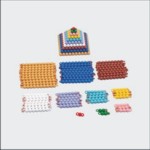Montessori is a teaching methodology and philosophy intended to teach children independant life and learning skills in a specially prepared classroom enviroment.Using specifically designed,auto-didactic apparatus which is presented to an individual child at the correct stage of their development, children grouped in ages 3-6yrs , 6-9yrs and 9-12yrs develop their knowledge and abilities at their own pace.
There's been a great deal of mystery surrounding Montessori Education to date, mostly because it's difficult to define in one sentence or even a short paragraph. The fact is though, it's a very practical, insightful way of teaching children of all ages to learn, as Paula Polk Lillard points out in ' Montessori Today'. She suggests this methodology focuses on "connecting the education of children to their development as human beings".
Paula, like most authors who pen the history and philosophy of the school's creator, Maria Montessori, is an American who was drawn to teaching the Montessori method in primary schools and eventually opened her own. Americans have embraced the philosophy and have more Montessori schools-many attached to state schools- per capita than anywhere else in the world. This observation is pointed out in an informative piece by Jay Mathews for the Washington Post.
Interestingly though , Britain opened it's first fully state funded Montessori primary school in one of it's worst performing schools in the country, situated in one of the poorest areas of Manchester, England. The education board picked 100 of it's worst students at the school to be grouped into a Montessori learning programme in the hope that it's methodology would improve learning as it had done for so called 'retarded' children 100 years before.; staff writers at the Guardian regularly enquire into the Montessori method of schooling due to it's psychologically proven benefits worldwide.
So who were Maria Montessori's original students with whom she had such profound results?
Sunday, May 25, 2008
Subscribe to:
Posts (Atom)
